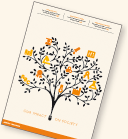Raising literacy levels
Through our products and partnerships we aim tomake a difference to raising literacy levels aroundthe world, helping people to learn to read and to enjoy reading.
Being able to read has a profound influence on modern life. How well you do at school, what job you get and even how you get involved in local community life all depend on being literate. As reading is the basic building block that helps people to realise their personal potential, it is no surprise that raising literacy levels is one of our three priority focus areas.
It is also quite a challenge as around the world, one in five adults cannot read; put another way, that is nearly 800 million people that are yet to be reached.
Most of the people who cannot read are in poorer areas of the world. Africa, as a whole continent, has less than a 60% literacy rate. Countries with large numbers of non-literate adults include India, China, Bangladesh, Pakistan, Nigeria, Ethiopia, Indonesia, and Egypt.
However, it would be a mistake to think that not being able to read is only an issue in developing economies of the world. According to the National Adult Literacy Survey, there are some 40 million adults in the United States who cannot read or write well enough to deal with the everyday requirements of life. Similar research suggests that one-fifth of adults in England have difficulties with basic literacy.
For a business built on the premise that people can read, learn and enjoy doing it, we have a keen interest in doing all we can to help generate more and enthusiastic readers.
Our approach
We make a difference in three main ways:
Our reading programmes – both print and digital – are found in classrooms the world over;
For many, the first story that they read or that is read aloud to them will be one of our titles;
We run projects and campaigns, often in partnership with the Pearson Foundation, that encourage reading or promote literacy.

